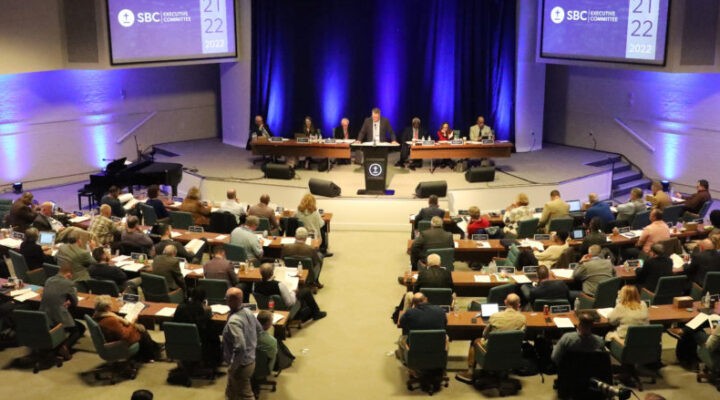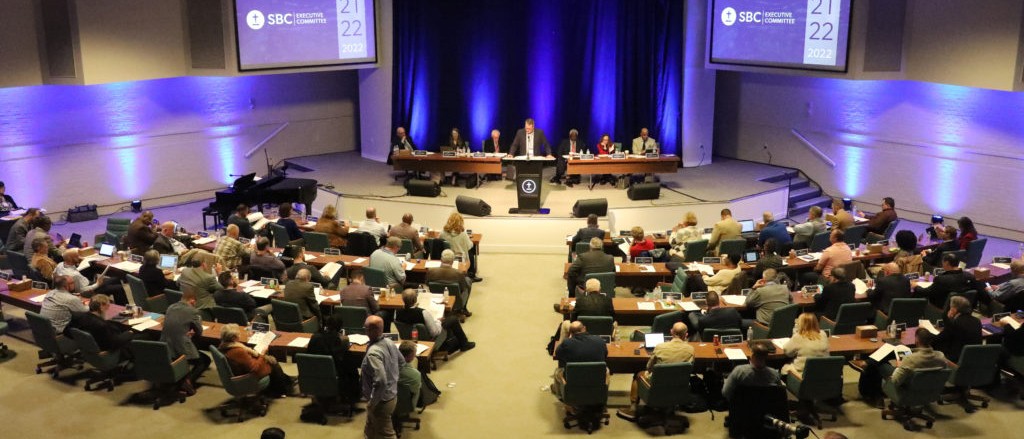The Southern Baptist Convention’s reckoning with abuse continued unfolding in the public eye this week with multiple fiery Twitter exchanges and leaked audio of a confrontation between two male pastors and a female abuse survivor.
The kerfuffle began the night of Wednesday, March 16, with a tweet from Dean Inserra, lead pastor of City Church in Tallahassee, Fla. Inserra is a trustee of the SBC Executive Committee, a group at the center of a current independent investigation into allegations of mishandling sexual abuse claims.
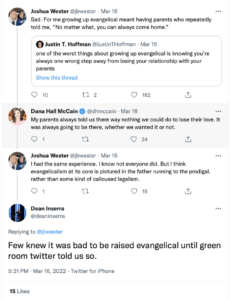 “Few knew it was bad to be raised evangelical until green room twitter told us so,” Inserra tweeted. This was in reply to a longer thread of comments replying to a tweet from a graphic designer named Justin T. Hoffman who opined, “One of the worst things about growing up evangelical is knowing you’re always one wrong step away from losing your relationship with your parents.”
“Few knew it was bad to be raised evangelical until green room twitter told us so,” Inserra tweeted. This was in reply to a longer thread of comments replying to a tweet from a graphic designer named Justin T. Hoffman who opined, “One of the worst things about growing up evangelical is knowing you’re always one wrong step away from losing your relationship with your parents.”
One of those taking public exception with Inserra’s comment was Hannah Kate Williams, who last month staged a protest across the street from SBC Executive Committee headquarters to call attention to the claims of sexual abuse survivors like herself.
Last August, Williams filed a sweeping lawsuit against multiple SBC entities and employees, including the Executive Committee, alleging a “conspiracy to cover up sexual abuse claims.” That lawsuit recently was withdrawn without prejudice, meaning it could be refiled. Around the same time, Williams also changed legal representation. At the February protest, she was accompanied by Brian Kent, a high-profile trial lawyer who previously represented survivors of abuse by former Penn State Coach Jerry Sandusky and several Catholic priests, among others.
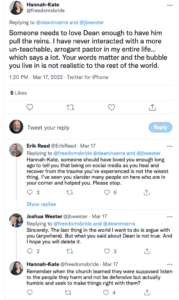 Williams took issue with Inserra’s Twitter reply on the afternoon of the following day, and fired back with the following words: “Someone needs to love Dean enough to have him pull the reins. I have never interacted with a more un-teachable, arrogant pastor in my entire life … which says a lot. Your words matter and the bubble you live in is not realistic to the rest of the world.”
Williams took issue with Inserra’s Twitter reply on the afternoon of the following day, and fired back with the following words: “Someone needs to love Dean enough to have him pull the reins. I have never interacted with a more un-teachable, arrogant pastor in my entire life … which says a lot. Your words matter and the bubble you live in is not realistic to the rest of the world.”
At that point, Joshua Wester , an associate pastor at Redemption Church in Mobile, Ala. — where SBC President Ed Litton is pastor — defended Inserra and asked Williams to delete the tweet, which Williams refused to do.
Later that day, at 9:21 p.m., Wester tweeted in defense of Inserra again: “In case you didn’t know, @deaninserra is a faithful pastor and amazing friend. I am grateful to God for him.”
Leaked audio from Executive Committee conversation
Thirty-one minutes later, Abby Osborne, a friend and ally of Williams, tweeted her support of Williams: “I’ve been in the trenches with @freedomsbride for long enough now to see the manipulation and attacks from SBC leaders behind the scenes & how they take an immeasurable toll on her. NONE of the emotional distress stops her from doing hard, important things in sincere love.”
In the tweet that followed, Osborne leaked a 12-minute recording of a conversation that took place between Williams, Inserra and Wester sometime on Monday, Feb. 21, in Nashville, after the protest Williams organized outside Executive Committee headquarters.

Abby Osborne
“If you listen to this clip,” Osborne continued, “you’ll hear folks telling her that they’ll stand up for her if they ever see attacks. I’ve also seen the receipts, before and after Nashville, to know this simply isn’t true.”
Osborne stated that Williams did not ask her to record the conversation but had given her consent. Tennessee law requires only one party’s consent to record a conversation, a fact that came to light last summer when other secretly recorded conversations of other SBC officials were leaked, igniting a firestorm of protest about mishandling of abuse cases.
Throughout the newly released conversation, Williams can be heard speaking with a shaking voice, perhaps from crying. Four times during the conversation she states that she is hurt by the actions of the Executive Committee.
(See the editor’s note at the end of this article for an explanation of why BNG is quoting from this recorded conversation.)
‘Back channel’ communications
Several items discussed in the recorded conversation are of note.
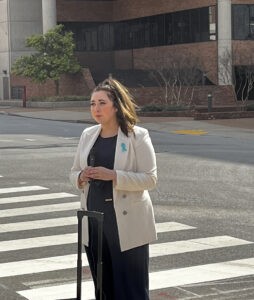
Hannah-Kate Williams speaks to media outside the SBC Executive Committee building Feb. 21.
First, Williams points out that she was made aware through Twitter that Rod Martin, a businessman from Destin, Fla., had resigned from the Executive Committee in protest of its decision to waive attorney-client privilege for the independent Guidepost investigation. Martin is a controversial figure who himself has been accused of demeaning Williams and her campaign for justice for abuse survivors. Williams emphasizes that not knowing about Martin’s resignation is just another example of how survivors are often kept “in the dark” and find information related to the convention’s handling of abuse claims through “back channels.”
“That’s how I found out too,” Inserra is heard replying.
Martin is again mentioned at around the five-minute mark by Wester, who remarks, “I’ve never had one positive interaction with Rod Martin, because of who he is,” before Inserra interjects, “Yeah, we, like, had a party when he resigned. … We were like, ‘He’s a snake and get him out of here.’ That was our response.”
Williams later states that while she was glad for Martin’s resignation, she felt like he had escaped any meaningful accountability and discipline for his alleged actions to prevent meaningful response to the sexual abuse claims.
BNG reached out to Martin for comment but did not receive a reply.
‘Why do Executive Committee members think I’ll turn on them?’
Beginning at the 6:24 mark, Williams states that she received a text message from Executive Committee member Adam Wyatt of Magee, Miss., “that said most of you guys (meaning members of the Executive Committee) avoid me because you think I treat you like the enemy.”

Dean Inserra
Williams follows up with a query: “Where does that come from? … Why do Executive Committee members think I’ll turn on them?”
“I’ve not been in an Executive Committee meeting where we talked about that,” Inserra replies.
BNG reached out to Wyatt for comment, but he declined to comment.
‘Who is the SBC?’
Throughout the conversation, Williams challenges Inserra and Wester on the inconsistency of advocating for abuse survivors in their own churches but not taking steps toward lasting reform for survivors who were harmed by SBC institutions.
“It’s great that you guys serve survivors at your church,” Williams is heard saying. “And so, caring for them is great. And we want that, but that doesn’t take away from any responsibility you have to make it right with the people who are hurt, not by you individually, but by your institution you represent.”

Joshua Wester
While speaking of survivors of abuse within the SBC, Wester suggests at the 9:21 mark that some survivors are “totally detached” from the SBC “for good reasons.” Williams can be heard taking issue with that remark, firing back, “I’m not totally detached from that community.”
“Are you part of a church?” Inserra asks in reply.
“I am a part of a church,” Williams loudly retorts before stating that her church is taking issue with the SBC because it is “not caring for me well.”
At this, Inserra asks, “Who does that mean? I’m not being dismissive. Like, I’m totally asking. Who is the, who is the SBC?”
Williams clarifies that, “in this context,” she is speaking of the Executive Committee.
The recording ends with Williams telling Inserra and Wester through what sounds like soft sobbing, that, despite her frustrations, she loves them.
Tom Buck responds
An hour and a half after the conversation was leaked, Williams tweeted that Wester had blocked her on Twitter.
East Texas pastor Tom Buck, a vocal online conservative critic of SBC leadership, took to Twitter that night to react to these developments: “I honestly wonder if Grant Gaines has any regrets of opening Pandora’s Box upon the SBC,” he quipped, making reference to the pastor who made the original motion for an independent investigation of the SBC Executive Committee.

Tom Buck
Buck again took to Twitter the following day, March 18, to slam Inserra and Wester by asking, “Should @deaninserra and @jbwester be given the same grace and consideration that was given to @PastorMikeStone when he was ‘ambushed’ by @freedomsbride?”
This was a reference to an encounter between former Executive Committee chairman and SBC presidential candidate Mike Stone of Georgia and Williams that occurred before other witnesses in a convention hall in Nashville during last year’s SBC annual meeting. Williams and Stone have offered conflicting reports on the conversation.
At this, Williams replied to Buck by mentioning the threat of legal action: “You need to find a hobby or you will find yourself in a lawsuit. Don’t be dumb enough to think everything you’ve written, liked, retweeted, shared online hasn’t been documented.”
Buck provided the following statement to BNG when asked for comment:
“Now that they are being accused of mistreating a survivor, they want to be extended grace and consideration that they were unwilling to give to Mike Stone.”
“When Mike Stone was accused of mistreating a survivor at the SBC 2021 annual meeting, these men and their friends either joined the attacks on Stone or remained silent. Now that they are being accused of mistreating a survivor, they want to be extended grace and consideration that they were unwilling to give to Mike Stone. I wonder if they are now sympathetic for what happened to Mike Stone.”
Stone was the candidate backed by a group known as the Conservative Baptist Network that advocates for a second “conservative resurgence” in the SBC. Litton was elected SBC president in a tight race against Stone.
A ‘profoundly painful history’
When asked what she made of the conversation between Williams, Inserra and Wester, Christa Brown, a prominent survivor, advocate, retired appellate attorney and whistleblower, offered the following statement:

Christa Brown
“Morally and ethically, the Executive Committee has an obligation to try to make amends for the harm it has done in many survivors’ lives. I made public a 29-page memorandum detailing and documenting numerous aspects of my own experience that specifically involved the Executive Committee. It sets forth a long and profoundly painful history in which the Executive Committee did me much harm. And there has not been even an expression of remorse from the Executive Committee, much less any attempt at remediation of the harm. These things need to happen — for me, and for a whole lot of other survivors.”
In February, the Executive Committee did take the unprecedented step of issuing a public apology to one abuse survivor, Jennifer Lyell, whose story of abuse had been misrepresented by Baptist Press, the SBC’s news service managed by the Executive Committee.
Brown offered her most scathing criticism, though, for the question asked by Inserra of Williams at the 5:43 mark. In the context of Williams’ assertions against Rod Martin, Inserra asks: “What’s the scope of what I’m supposed to (do)?”
To which Williams replies: “You investigate and you ask questions.”
Inserra responds: “Me personally?”
Williams says: “If you are going to say, ‘I stand by survivors,’ and if you’re going to lead in this arena, you have hard conversations with survivors.”
“This question gets at one of the fundamental difficulties on dealing with clergy sex abuse in the SBC. It is a buck-stops-nowhere system.”
This exchange illustrates the heart of the problem in the SBC, Brown said. “This question gets at one of the fundamental difficulties in dealing with clergy sex abuse in the SBC. It is a buck-stops-nowhere system. This is exactly why there must be new institutional structures to assure that all clergy sex abuse reports get investigated by those with the expertise and independence to do so responsibly, to assure effective systems for record-keeping and information-sharing on credibly accused clergy, and to provide a safe, predictable and transparent system for survivors and whistle-blowers who make reports. With a predictable and transparent system, pastors and leaders wouldn’t have to ask, ‘What’s the scope of what I’m supposed to do?’ And survivors wouldn’t be left wondering and hanging for years either.”
BNG also reached out to Inserra and Wester for comment on this story, and both declined to comment.
Next steps
These new developments in the SBC survivor community come merely a couple of months before the scheduled public release of findings in the independent investigation of the Executive Committee being conducted by Guidepost Solutions. Guidepost has said it will send the findings of its investigation to the Sexual Abuse Task Force 30 days before the June 12-15 SBC annual meeting. The Sexual Abuse Task Force then will have a week to formulate responses and recommendations before the findings will be released publicly.
A March 11 update from the task force stated: “During the last month, Guidepost Solutions continued its independent investigation and focused on document review and witness interviews. To that end, Guidepost has reviewed and processed substantial amounts of information (more than five terabytes of data). Further, Guidepost has contacted and interviewed dozens of current and former Southern Baptist Convention Executive Committee staff and Trustees. These interviews are essential in conducting a full, fair and comprehensive investigation and assessment. The interviews also provide an opportunity for interviewees to offer recommendations and provide feedback as to how the SBC Executive Committee can create a safer community going forward.”
Editor’s note: This is the second time in BNG’s coverage of the sexual abuse crisis in the SBC that we have quoted from recorded versions of what might be considered private conversations. In both cases, those recorded conversations have become public records before we have quoted from them. BNG is neither the source nor the repository of these recordings. Our reporting is based on their existence in a public sphere that has caused others to comment publicly on them. The conversation in this case occurred in a public building during a multi-day meeting at which many other people were present, not in a private setting.
Related articles:
A story behind the story on the SBC and sexual abuse | Opinion by David Bumgardner
29-page memorandum illustrates what the SBC Sexual Abuse Task force is hearing
SBC’s new reporting process again fails clergy sex abuse survivors. What’s needed is an independent review panel | Opinion by Christa Brown
SBC Sexual Abuse Task Force has lost one-third of its time to delays, but now the work may begin

